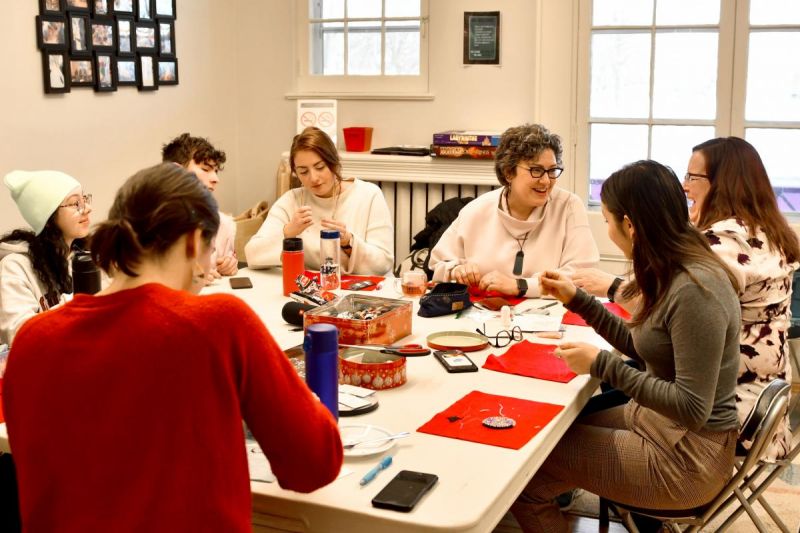Queen’s Indigenous health researcher named Indspire Award winner
Assistant professor Karen Lawford honoured for outstanding career achievements in health.

Karen Lawford (third from right) leading a weekly beadwork class at Queen's University's Four Directions Indigenous Student Centre.
The first Indigenous midwife in Canada to earn a doctoral degree will be recognized with a 2020 Indspire Award – the most prestigious career excellence award bestowed by the Indigenous community on its own people. Queen’s University’s Karen Lawford has been named one of this year’s 12 outstanding Indigenous leaders, and will be honoured with the Indspire Award for Health at a nationally-televised ceremony on March 6.
“I am incredibly honoured to have my career achievements recognized by Indigenous Peoples and by Indspire,” says Dr. Lawford, a registered midwife, Aboriginal midwife, and assistant professor in the Department of Gender Studies engaged in research examining the provision of maternity care on reserves in Canada. “My achievements, however, are not accomplished without meaningful relationships and trust from Indigenous peoples. I strive to continue working with Indigenous communities to bring to light the discrepant health care services that are provided to those who live on reserves and outside of large urban settings.”
Closures of birthing units in rural and remote Indigenous communities across Canada have resulted in medical evacuation to southern, urban medical centres becoming normal practice. Dr. Lawford’s most recent study looked at Health Canada’s evacuation policy for those living on reserves in Manitoba.
“These sorts of policies are exacerbating the maternity health crisis facing our communities nationwide,” says Dr. Lawford, who is from Lac Seul First Nation. “I do hope my research and policy contributions are considered by decision makers so that Indigenous peoples are able to grow their families and communities in a manner that supports their specific health and wellness needs.”
Dr. Lawford also examines Indigenous women and Two Spirit leadership in health care and health science as part of her research.
“There have been concerted efforts to dismantle the governance systems of Indigenous peoples, with specific efforts to destroy the roles of women and Two Spirt community members,” she says. “My research in this area aims to begin the restoration of their roles, and to amend this imbalance of representation in health care and health science. Currently, health care does not represent the populations they serve. We need leadership to shift more quickly so that systemic change can be realized.”
In reflecting on her career up until now, Dr. Lawford says that her most meaningful career accomplishment culminated in earning a tenure-track faculty role at Queen’s, which signaled institutional support of her research.
“I feel a great sense of responsibility to ensure Indigenous academics and Indigenous midwives are supported within the academe,” she says.
Queen’s Principal and Vice-Chancellor Patrick Deane expressed his congratulations to Dr. Lawford on behalf of the university.
“Dr. Lawford’s research profoundly informs our collective understanding of the challenges faced by Indigenous communities with respect to access to health care, particularly maternity care, in Canada. Her work brings to light inequities still to be addressed and is a shining example of how research can facilitate necessary change,” he says.
To learn more about Karen Lawford’s Indspire Award win and the full list of this year’s winners, visit the Indspire Awards website. Following the award ceremony on March 6, it will be broadcast Sunday, June 21 on CBC, APTN, and CBC Radio One.
Note: This article originally appeared in the Queen's Gazette.

